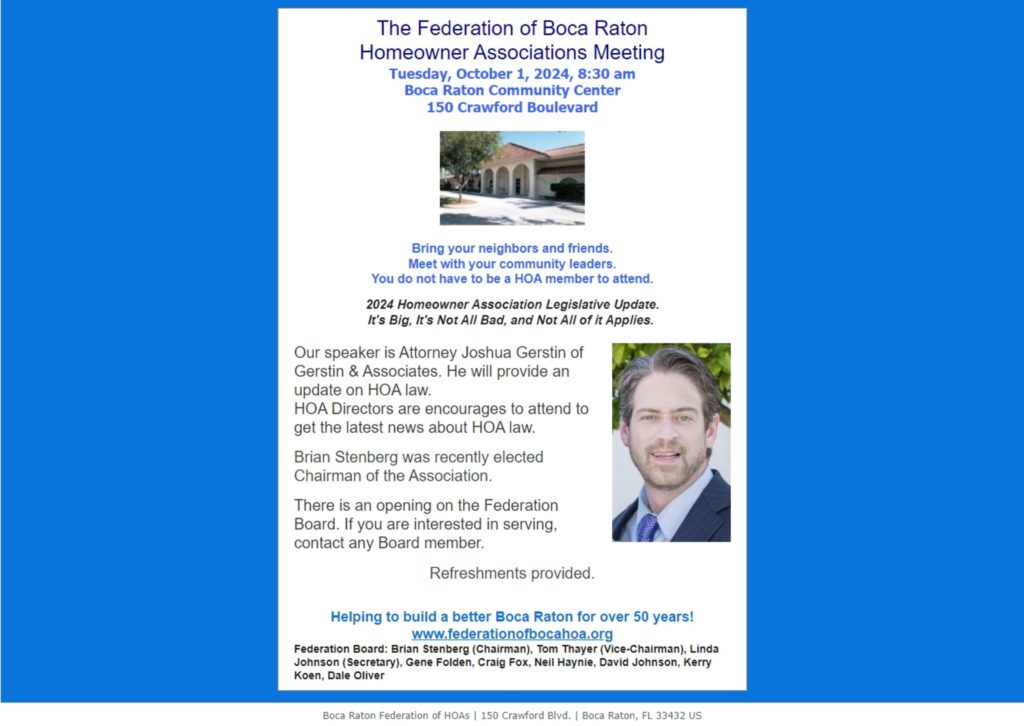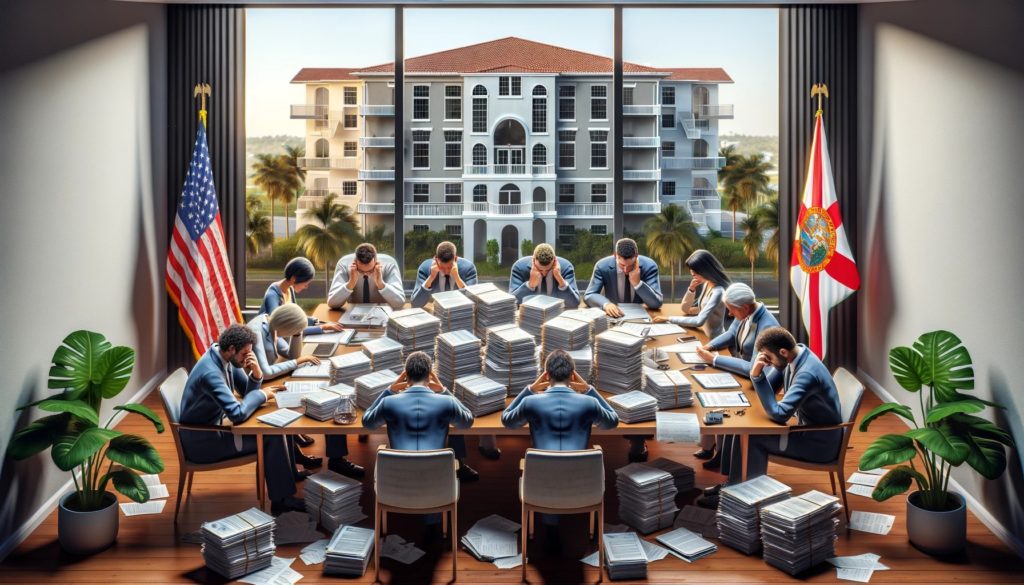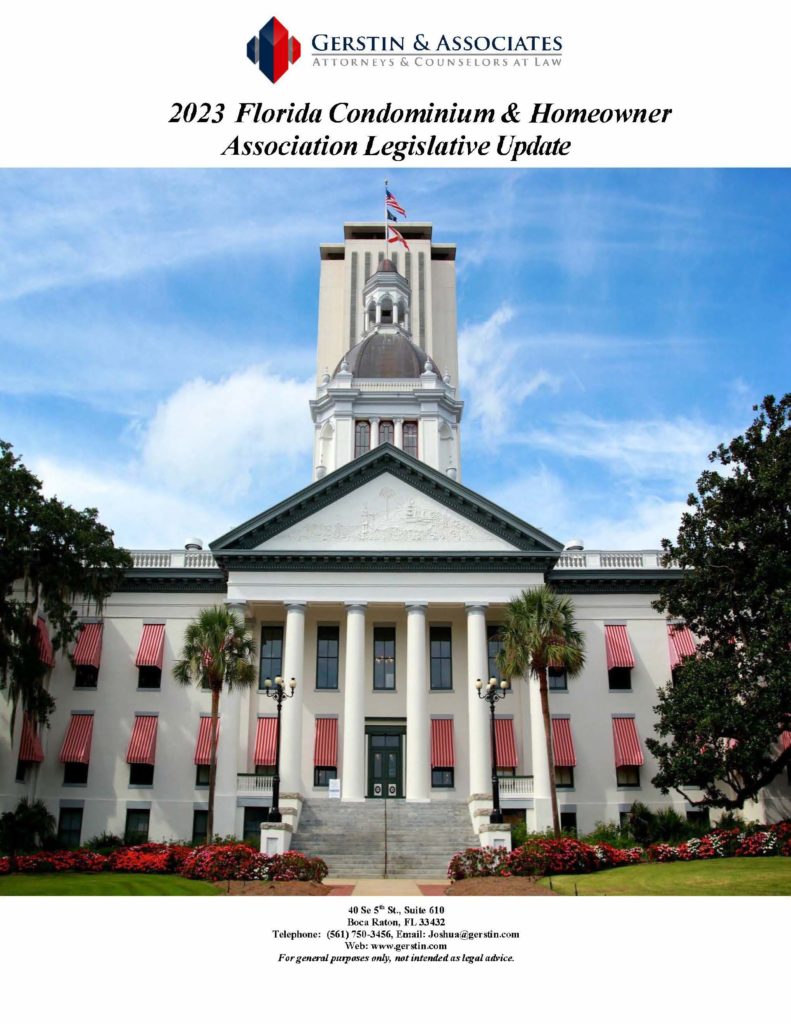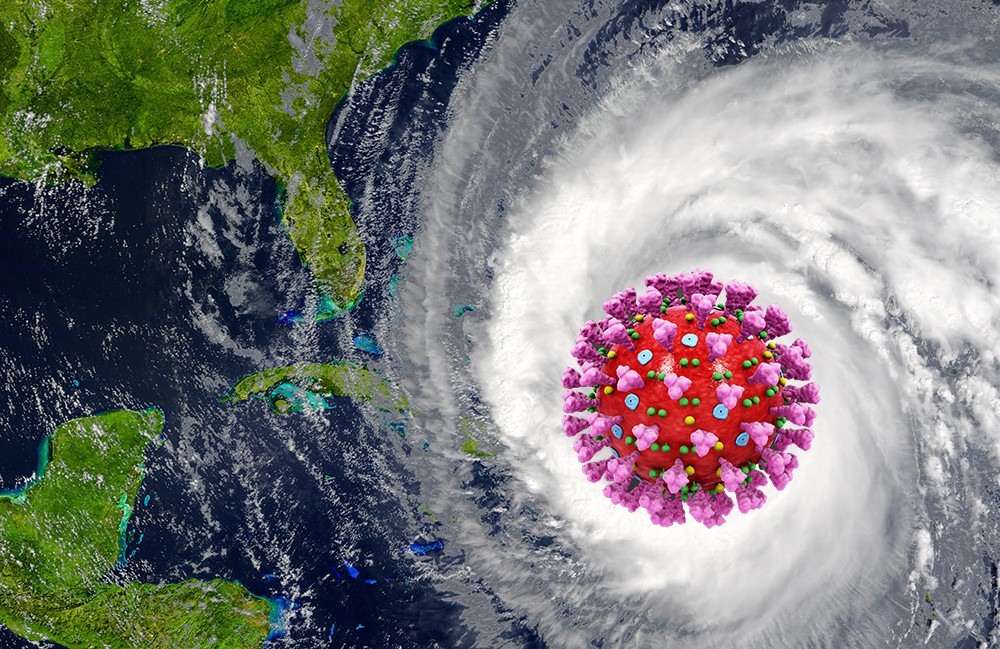The Do’s and Don’ts of Retrofitting your Community Association for Pickleball.

By: Joshua Gerstin, Esq.
Gerstin & Associates

By: Joshua Gerstin, Esq.
Gerstin & Associates


click here for .PDF of this article
“A butterfly flaps its wings in Africa, and a hurricane lands in Florida six months later.” The same can be said about community associations. A few bad actors in one part of the state are caught, and six months later, an entirely new regulatory scheme for community associations is passed.
Known as “Condo 3.0,” the recently passed legislation affecting condominium associations is extensive. Plan ahead to avoid issues, the legislation goes into effect on July 1, 2024.
Although not as extensive as the condominium association legislation, homeowner associations were not spared extra regulation. The legislation affecting homeowners associations goes into effect on July 1, 2024.
Click here for the full text of the bill
The bill requires community association managers (CAMs) and CAM firms to return all community association records in their possession within 20 business days of termination of a services agreement or a written request whichever occurs first, with license suspension and civil
penalties for noncompliance, except that the time frames applicable to timeshare plans apply to the records of a timeshare plan.
The bill provides conflict of interest disclosure requirements and a process for associations to follow when approving contracts with CAMs and CAM firms, or a relative, that may present a conflict of interest. The requirements are similar to the conflicts of interest provisions for condominium associations and their officers and directors, including:
Currently, single-family, two-family, and three-family dwellings are exempt from the milestone inspection requirements. The bill exempts four-family dwellings with three or fewer habitable stories above ground.
Regarding access to the official records of a condominium association, the bill:
The bill provides the following criminal penalties related to condominium associations, and the official records of the association:
The bill provides that officers and directors charged with a criminal violation under ch. 718, F.S., are deemed removed from office and a vacancy declared.
Regarding condominium association budgets, financial reporting, and reserves, the bill:
Condominium and cooperative associations must notify the division within 45 days after the SIRS is completed. By January 1, 2025, the division must create a database of associations that have completed the SIRS. After December 31, 2024, the division must include in its annual report a list of all associations that have completed the SIRS.
The bill requires:
The bill provides education requirements for the officers and directors of condominium associations to require:
Regarding voting in condominium and cooperative associations, the bill:
The bill revises the requirements for the installation of hurricane protection in a condominium building, including:
The bill revises the prohibitions against “strategic lawsuits against public participation” or “SLAPP suits,” which occur when association members are sued by individuals, business entities, or governmental entities for matters arising out of a unit owner’s appearance and presentation before a governmental entity on matters related to the condominium association.
The bill includes condominium associations in the SLAPP suit prohibition, and protects unit owners who report complaints to government agencies or law enforcement, or make public statements critical of the operation or management of an association by prohibiting associations from:
The bill provides that the attendance of an officer or director at a meeting of the board is sufficient to constitute a quorum for the meeting and for any vote taken in his or her absence when the director is required to leave the room during the discussion and the taking of a vote on a contract in which the director, or his relative, has an interest.
The bill expands the division’s post-turnover jurisdiction to include:
In addition, the bill:
The division must submit findings by January 1, 2025, to the Governor, the President of the Senate, and the Speaker of the House of Representatives, of its review and recommendations of the website or application requirements for official records.
The bill provides for the appointment of the Condominium Ombudsman by the DBPR secretary instead of the Governor, and deletes the requirement that the ombudsman must be an attorney.
The bill provides that the statute of limitations and statute of repose for certain actions available to a condominium association or a cooperative association, will not begin to run until the unit owners have elected a majority of the members of the board of administration.
The bill revises the form in which the prospective purchaser of a condominium unit acknowledges receipt of specified documents to include a copy of the most recent annual financial statement and annual budget of the condominium association.
Effective October 1, 2024, the bill also:
Condominiums Within a Portion of a Building or Within a Multiple Parcel Building The bill revises the definition for the term “condominium property” to mean “the lands, leaseholds, improvements, any personal property, and all easements and rights appurtenant
thereto, regardless of whether contiguous, which are subjected to condominium ownership.”
Effective October 1, 2024, the bill provides disclosure requirements for the creation of condominiums within a portion of a building or within a multiple parcel building. The association of a condominium created within a portion of a building or within a multiple parcel building has the right to inspect and copy the books and records upon which the costs for maintaining and operating the shared facilities are based and to receive an annual budget with respect to such costs.
The bill also requires the Florida Building Commission to submit a report by December 1, 2024, to the Governor, the President of the Senate, the Speaker of the House of Representatives, and the chairs of the legislative appropriations committees and appropriate substantive committees with jurisdiction over ch. 718, F.S., of its review of the standards to prevent water intrusion through the tracks of sliding glass doors.
Click here for the full text of the bill.
The bill relates to using surplus lines of insurance for non-homesteaded homes (second homes).
Effective July 1, 2024.
Click here for the full text of the bill.
This bill creates a Condominium Pilot Program within the very popular My Safe Florida Home Program(Opens in a new window) that continues to be available to single family homes. Single family homeowners may get the free inspection and apply for their grant now. After July 1, 2024, the site will be updated to include condominium associations.
For condo associations to participate they must meet the following criteria:
Approval by a majority vote of the board of directors or a majority vote of the total voting interests of the association to participate in a mitigation inspection.
A unanimous vote of all unit owners within the building that is the subject of the mitigation grant.
Click here for the full text of the bill.
The bill relates to the governance of homeowners’ associations and the practice of the community association managers who manage those communities.
Regarding community association managers (CAMs) and CAM firms, the bill requires CAMs and CAM firms to:
The bill requires homeowners’ associations to:
The bill provides the following criminal penalties related to homeowners’ associations:
for the commission of a crime, or to assist another person with such avoidance or escape; and
The bill also expands the current criminal prohibitions against fraudulent voting activity to provide it is a first degree misdemeanor for:
·
Any officer or director charged with a criminal violation under ch. 720, F.S., must be removed from office and a vacancy declared.
The bill requires associations, if subpoenaed, to provide a copy of the requested records within five business days of receiving the subpoena and to assist law enforcement in any investigation to the extent permissible by law.
The bill:
The bill allows association parcel owners to make a written request for a detailed accounting of any amounts owed to the association. If the association fails to provide the accounting within 15 business days of a written request, any outstanding fines of the requester are waived if the fine is more than 30 days past due and the association did not give prior written notice of the fines. It also prohibits parcel owners from requesting another detailed accounting within 90 days of such a request.
The bill revises the education requirements for the directors of homeowners’ associations to:
The bill requires associations or an architectural, construction improvement, or other similar committee to:
Associations must have a hearing before a committee to review a fine or suspension issued by the board, and the bill:
The bill prohibits homeowners’ associations from issuing a fine or suspension for:
The bill also provides that homeowners’ associations may not prohibit a homeowner or others from parking:
In addition, the governing documents may not prohibit a property owner from:
The bill allows members of a homeowners’ association to consent to electronic voting by using an electronic means of consent. Current law requires written consent to vote electronically.
The bill permits only simple interest, not compound interest, to accrue on assessments and installments on assessments that are not paid when due.

On May 5, 2023, Florida’s Legislature concluded its annual 60-day legislative session. Unlike previous legislative sessions, this year’s session garnered little media attention while the legislators were busy at work passing many laws impacting Florida’s community associations.
For the .pdf version of this article, click here.
Following is a list of the bills Governor Ron DeSantis recently signed into legislation:
Board meeting notices. All Board meeting notices must specifically list the meeting’s agenda.
Owner deposits. If a homeowners association collects a deposit from a member for any reason, including for a tenant or construction, and regardless if it is called a “security deposit,” the association must maintain all funds separately and not commingle them with association funds. Additionally, all funds deposited with the association must be returned within thirty days after receiving notice the reason for which the deposit was collected is complete. If requested by the owner, the association must provide an accounting of the funds deposited within seven (7) days of receiving the request.
Kickbacks. If an officer or director (or property manager) solicits or receives anything of value for him or his family from any person or entity providing goods or services to the Association may be immediately removed from the Board by the remaining Board of Directors. The violator is also subject to civil monetary fines. However, an officer, director, or manager may continue to accept food consumed at a business meeting with a value of less than twenty-five dollars ($25.00) per person or a service or good receipt in connection with the trade fair or education program.
Official Records. The law clarifies any parcel owner, or their authorized representative, may inspect Official Records.
Fines. The existing law was clarified to make it clear that fines may be levied for violations of the declaration, bylaws, or rules. Additionally, the notice to the member from the fining committee must include a description of the alleged violation, the specific action required to cure such violation, if applicable, and the date and location of the hearing. A parcel owner can attend a hearing by telephone or other electronic means. The letter from the finning committee after its hearing must include any applicable fines or suspensions the committee approved or rejected and how the parcel owner or any occupant, licensee, or invitee of the parcel owner may cure the violation, if applicable. All payments for fines are due within five days from the notice to the member.
Voting. Each of the following acts is considered a fraudulent voting activity and constitutes a misdemeanor of the first degree:
Flags. If displayed respectfully, a homeowner may display up to two (2) of the following flags:
Storage & Display of Items. An association may not restrict parcel owners or their tenants from installing, displaying, or storing any items on a parcel that are not visible from the parcel’s frontage or an adjacent parcel, including, but not limited to, artificial turf, boats, flags, and recreational vehicles.
On June 9, 2023, Governor DeSantis signed the “glitch” bill to purportedly fix some issues with the recent “Surfside” related inspection law. The full text of the law is available here, and a .pdf of this portion of the article is available here. Unless otherwise indicated, this legislation takes effect immediately. As with many legislative efforts, determining the effectiveness of the legislation and the discovery of unintended consequences takes time. At the very least, the changes to the Structural Integrity Reserve Study law (SB 154) listed below are a good start:
Reserve Funding:
Inspections:
When implemented by an association, the following safeguards exempt an association from liability if a third party commits a crime on their property:
Stay one step ahead of new legislation, recent case law, and new developments that may impact your community association by subscribing to the Gerstin & Associates newsletter.
Click Here to Subscribe to the Gerstin & Associates Newsletter

In the wake of Surfside, some South Florida’s condominium associations cannot find lenders willing to lend for capital projects or to potential buyers. It’s doubtful South Florida’s condominium associations that restored, rehabilitated, and stabilized their operation can ever leave the list.
For more information:
Fannie Mae, Freddie Mac Keep Secret “Blacklist” of Properties (therealdeal.com)

–By Joshua Gerstin, Esq.
If you own a condominium in Florida, it is important to be aware of the significant cost increases condominium owners will face due to recent changes in Florida law and ever-increasing insurance premiums. In particular, the new Structural Integrity Law, with its mandated increases in reserve requirements and the skyrocketing cost of insurance, will cause many Florida condominium owners to sell their units and many condominium associations to pursue termination of their condominium associations.
The Structural Integrity Law was passed in response to the collapse of the Champlain Towers South condominium building in Surfside, Florida, in June 2021. The law requires all condominium associations in Florida to complete a structural inspection by a qualified engineer or architect and a reserve study by the end of 2021. Condominium associations are required to make any necessary repairs identified in the inspection.
The cost of the required inspections, reserve study and repairs can be significant. According to estimates from the Community Associations Institute, the cost of a structural inspection alone can range from $10,000 to $50,000 or more, depending on the size and complexity of the building. Repairs identified in the inspection can cost millions of dollars, and may require assessments or increases in monthly assessments to cover the costs.
In addition to the costs associated with the Structural Integrity Law, Florida condominium owners will also face increases in reserve requirements. The Structural integrity law prohibits the pooling of reserves for certain designated items or items identified as in need of repair by the structural inspection. Additionally, the law also removed the ability of condominium associations to partially fund or waive full funding of reserves.
The increase in reserve requirements will likely result in higher monthly assessments for condominium owners in associations that routinely chose not to fully fund their reserves. Condominium associations may need to levy special assessments to make up for any shortfall in reserve funds. These assessments can be a significant burden on condominium owners, particularly those who are already struggling financially.
Finally, condominium owners in Florida can expect to see exponential increases in their insurance premiums. Insurance companies are raising rates for condominium associations in response to the Champlain Towers South collapse and the resulting scrutiny of building safety and maintenance practices.
The new Structural Integrity Law, along with increases in reserve requirements and insurance premiums, will have a significant impact on the costs of owning a condominium in Florida. Condominium associations have options to mitigate these issues, but they have to act fast by taking steps NOW to ensure their condominium associations remain financially stable with a safe and secure living environment for their residents.
Six golf country clubs in Palm Beach County – Hunters Run, Quail Ridge, Wycliffe, Old Palm, Banyan Cay and the Loxahatchee Club – may have received as much as $18 million in PPP loans through the Small Business Administration.
Six golf course communities are among the more than 3,000 businesses in Palm Beach County that received Payroll Protection Program (PPP) loans through the Small Business Administration (SBA).
An analysis of the loans released this week by the SBA shows that the six clubs may have received as much as $18 million. The SBA had been sued by a number of newspaper organizations over the identity of the loan recipients. When the applicants applied, they were told the loans would be public record.
The program was designed to keep employees on the payroll. If employers do that and comply with the loan conditions, the loans become grants and do not have to be repaid.
The SBA agreed to identify all recipients of loans in excess of $150,000 but only provided ranges of funds received, refusing to reveal the exact amount.
The data released by the SBA do not include the amount of the loan but rather the loan amount a bank has approved. The actual amount of a loan could be smaller than the approved amount. All amounts are in ranges.
Some golf course communities that accepted PPP loans in Palm Beach County have recently spent upward of $10 million on massive improvements to their clubhouses and golf courses.
The clubs that took the money include:
– Hunters Run ($2 million to $5 million) in Boynton Beach.
– Quail Ridge ($1 million to $2 million) in Boynton Beach.
– Wycliffe ($2 million to $2.5 million) in Wellington.
– Old Palm ($1 million to $2 million) in Palm Beach Gardens.
– Banyan Cay Resort Club ($700,000 to $2 million) in West Palm Beach.
– The Loxahatchee Club Homeowners Association ($150,000 to $300,000) in Jupiter.
Scores of other Palm Beach country clubs had applied for the PPP loans. Many were approved but decided to refuse to accept the money on both moral grounds and legal grounds after reading the fine print. Government auditors are expected to review how the money was spent and can ask for the money to be returned and penalties to be imposed if they find misrepresentations.
Fifty-seven country clubs in Florida accepted the PPP funds. According to CNBC, more than 400 country clubs and golf courses received loans throughout the country. The issue of whether it is appropriate for golf course communities to receive PPP loans has been debated.
Assessment revenue a factor
Joshua Gerstin, a Boca Raton lawyer who specializes in homeowner and condominium association law, said he expects one factor the SBA will consider is how much revenue a country club gets from its assessments.
“If it is mostly assessment driven, the country club might have a problem,” he said. “If members continued to pay their assessments, there was no real loss of revenue. But if much of it comes from dining and other sources that members pay outside of their assessments, they could be eligible.”
According to the SBA, businesses must certify that the loan is needed “to support ongoing” operations and that they are unable to access “other sources of liquidity” to support their ongoing operations.
Addison Reserve General Manager Michael McCarthy said once he and his board saw those revised requirements, they decided that it would be wrong to participate in the PPP program.
“There was no way I could certify that we needed it stay in business or that we didn’t have other sources of liquidity,” he noted.
Wycliffe, Quail Ridge: We preserved jobs
Hunters Run President Michael Soroka declined to comment on the issue. According to the SBA, Hunters Run and Banyan failed to provide data to indicate how many jobs were saved by the loans. Wycliffe was chastised on CNBC early Tuesday morning for accepting its loan. The Post has learned that the Wycliffe loan amount was $2 million. It was able to preserve 281 jobs. Wycliffe’s general manager, Rob Martin, released a statement to The Post that read:
“At Wycliffe, we are thankful to all of our employees for their hard work and dedication through these challenging times. We took PPP money because we care deeply about our team and wanted to make sure that we had the ability to provide them a regular paycheck. Following the legal parameters, we only requested and received enough to cover our payroll needs and did not use our loan in any way to disadvantage other companies. We are thankful that we qualified to receive money so that our employees and their families could make ends meet during these challenging times.”
Quail Ridge GM William Langley said the PPP loan was used as intended. He noted that Quail Ridge would have had to have laid off many of its 300 employees without the loan. “We are not a club with deep pockets,” he said.
The Club at Admiral’s Cove in Jupiter was one of those that returned the funds – $3.1 million. “We saw too many issues, both moral and legal,” said CEO Bret Morris. “We did not want to take the risks.” He said Admiral Cove was able to keep its 500 employees working, noting: “We found other things for them to do.”
 – By Joshua Gerstin, Esq.
– By Joshua Gerstin, Esq.
Hurricane season begins on June 1st and lasts 5 months, with storms typically peaking in August and September. Due to COVID-19, this hurricane season will be unlike all others. Properly preparing for this unique hurricane season could truly be a lifesaver. The following hurricane preparation checklist is a combination of over twenty years of community association legal experience and new COVID-19 precautions:
COVID-19 Related Hurricane Checklist:
— Start stocking up on cleaning supplies now. Most stores have limited cleaning supplies or only allow a limited number of purchases. It is going to take a lot longer to obtain all the cleaning supplies you will need.
— An abundance of hand Sanitizer, soap, disinfectant spray, disinfectant wipes and face masks are the COVID-19 supplies your community association will need if a hurricane strikes.
— Plan for extended power outages (generator fuel, ice, flashlights, extra petty cash and installing a landline). Although FPL has been burying power lines and improving the electrical grid, additional workers will be needed to restore power after a hurricane. COVID-19 testing of these workers will cause delays and will limit the size of this additional workforce as infected workers are turned away.
— Purchase locks and non-electronic security equipment to keep buildings and common areas secure from vandalism or looting during an extended power outage.
— Go to the app store for your mobile phone and download the official FEMA app. A face-to-face meeting with an adjuster after a hurricane strikes is unlikely. FEMA has made available a phone app that can allow insurance companies to provide estimates without an in-person visit. When the app is running, it can take photos and measurements and gather additional information as you walk through your common areas.
— Confirm shelter locations, evacuation routes and remind residents to take their pets if they evacuate. Due to COVID-19 shelters and evacuation routes across Florida have changed. Officials are considering protocols for shelters that range from separating people based on temperature checks to non-congregated sheltering in hotels. Direct residents to https://www.cdc.gov/disasters/hurricanes/covid-19/public-disaster-shelter-during-covid.html for further information about staying virus free in a shelter.
— Establish a designated area that allows for social distancing where residents can meet for more information after the disaster.
— Inform residents in writing the extent of help the association will be providing (and not providing) during and after a hurricane. Urge your residents to begin their own preparation and evacuation plans.
— Update your contact list of owners, board members and staff. Ensure the list contains the correct contact information for seasonal residents. Print out the list and place it in a safe location (having it on your computer will do you no good when the power is out).
— Similar to the children’s game “telephone”, establish amongst the board of directors a chain of command for communications in the event a hurricane strikes. When a hurricane strikes, time should not be wasted by having to contact each board member or answer each board member’s non-emergency information inquiry.
— Update your vendor list, print it out and place it in a safe location (having it on your computer will do you no good when the power is out).
— Ensure your building’s plans and blueprints are in a safe location with easy access for first responders or insurance agents. Highlight shut-off valves, power-boxes, lift stations and debris staging areas.
— Service your association’s lift stations now to avoid sewage overflow if a hurricane strikes.
— Confirm all of your association’s data is being regularly backed up to the cloud or offsite.
— Copies of your association’s insurance policies, claims filing information and insurance agent’s contact information should be in paper form and secured in a safe location.
— Keep handy a list of all bank account numbers, branch locations and authorized association signatories. Have the board authorize an increased petty cash amount to be stowed away with your hurricane supplies. Credit cards, debit cards and computer checks will not be available if the power is out.
— Enter into contracts with vendors you will use during an emergency (water removal, debris cleanup repairs, etc.) to ensure they are available immediately after an “all clear” is given. Hurricane Irma struck during the same season a hurricane hit Puerto Rico and Texas. Many community associations were unable to secure vendors for the cleanup of debris and water because their vendor was assisting with other hurricanes.
— Pre-determine a staging area for debris and contract for debris dumpsters.
— Print out the instructions for updating the Association’s website and keep them in a safe location. Designated a member or director to provide frequent website updates regarding your association after a hurricane strikes. Off-site or seasonal residents will be searching for information and you do not want them contacting management if possible.
— Print out the instructions for updating the Association’s voicemail and keep them in a safe location. Residents and their loved ones will be calling for information and your association’s outgoing message on its voicemail is an effortless way to keep them updated.
— Make plans to shut down and secure clubhouses and other amenities, store furniture and to shutoff electric and water.
— Confirm all drainage areas and lines are working at full capacity.
— With proper socially distancing, establish a designated area within the association for posting hurricane-related updates.
— If you have a manned gate, make sure the attendants and the residents know at what point the attendants will be sent home and that the gates will be locked in the open position to provide emergency ingress and egress.
— Buy battery operated walkie-talkies and consider having a landline installed. Past hurricanes have taught us battery-operated walkie-talkies and a landline are the only communication methods that can be relied on if the power goes out.
— Stock up on and securely store gasoline, tarps, duct tape, sandbags, submersible water pumps, chain saws, water, flashlights, weather radio, batteries, and a video camera for documenting storm damage.
— Consult your elevator company on how to properly secure your association’s elevators.
— Ensure you have keys to each unit in your building.
— Have your Association’s trees trimmed, including the removal of all coconuts, seeds or potential hurricane “missiles”.
— Have all dead and dying trees removed. Consider waiting to replant any new trees until after the hurricane season. All new trees should be firmly staked and secured
— Identify residents who need special care and contact those owners and their families to determine if arrangements have been made for them. Remind all residents the elevators may need to be shut down or may not operate for an extended period due to a power outage.
— Inform residents in writing what to expect from the association before, during and after a hurricane strikes. Advise residents to communicate with friends and relatives elsewhere who will be concerned. Association offices oftentimes become overwhelmed after a storm with relatives calling from out of state to check on them. In the event of a mandatory evacuation, remind owners to keep all receipts related to additional living expenses, such as hotel accommodations and gasoline if an evacuation is mandated. These receipts may be reimbursable as part of an eventual insurance claim.
— Bring all objects inside that may be tossed about by wind or rain.
— Check all drainage areas and remove any debris that would restrict water flow.
— Lower the water in all pools, fountains and other water features.
— Shut down, close and securely lock all pools, water pumps (pools, fountains irrigation, etc.) and recreation areas.
— Videotape or photograph the building and all common areas with a date stamp to accurately document the property’s pre-storm condition for insurance purposes.
— Ensure all construction dumpsters are empty. If possible, arrange to have your regular dumpster emptied.
— Strategically place sandbags in areas where flooding is anticipated.
After the hurricane has passed:
— Stay calm, triage the association and focus only on life/safety issues.
— After the life safety issues are stabilized, focus on damage mitigation and recording the remediation work with photographs and video. Contact your vendors to come into the association to begin removing debris and items that are wet (drywall).
— Consider shadowing contractors and vendors as they inspect or work on individual units to avoid stolen property claims later.
— Continue documenting and recording the damage and remediation efforts for insurance purposes.
— In times of need, unscrupulous people always try to take advantage. Avoid vendors, contractors and third-party/private insurance adjusters soliciting your association’s business. If you have no choice, take the time to fully vet each one before signing anything.
— With the assistance of an attorney experienced in community association hurricane claims (joshua@gerstin.com), contact and file a claim with your association’s insurance carrier.
Click here for .pdf version with “checkable” fields for your ease of use!
"The purpose of law is to prevent the strong from always having their way."
--- Ovid